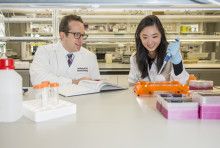Participation in a research scholarly concentration is an important step in giving medical students the aspiration to become physician-researchers, regardless of their research experience before entering medical school, according to a new study published in the Journal of Investigative Medicine.

The study found that students in the George Washington University (GW) School of Medicine and Health Sciences (SMHS) Clinical and Translational Research (CTR) scholarly concentration were more likely to place in a highly selective residency (40.2% vs. 21.6%), 68% more likely to publish after medical school, and almost four times as likely to take a job at an academic health center compared with their non-concentration peers.
“We had predicted that students who came into medical school with a lot of research were more likely to be successful because they had experience,” says author Alison Hall, PhD, associate dean for research workforce development at SMHS. “But what surprised us was that it didn’t matter if you’d done two years at the NIH or you’d never touched a test tube — the CTR scholarly concentration had a significant impact on medical students who go on to research careers.”
About 20% of first-year medical students at SMHS choose research as their concentration, a focused elective program the school has been running for more than a decade.
Hall and the study’s other authors, Laura Radville, PhD, former research program manager at SMHS; Annette Aldous, MPH, senior research assistant at the Milken Institute School of Public Health at GW; and Jennifer Arnold, former program assistant, compared data from 335 graduates from 2009 to 2018 who participated in the research concentration with data from the same number of graduates with no scholarly concentration.
Hall says the timing of the research scholarly concentration may have a larger impact than research prior to medical school because students are learning about research at the same time they are immersing themselves in medicine.
The SMHS research scholarly concentration, led by Hall and Naomi Luban, MD, chair of the Institutional Review Board and medical director of the Office for the Protection of Human Subjects at Children’s National Health System, offers “a brisk exposure to research,” Hall notes. The concentration matches students with mentors in their area of interest and consists of a research lecture series, a large research project conducted during the first and second years of medical school, research presentations, and a scholarly project, such as a research manuscript submitted for publication or a poster presentation at a professional meeting.
Hall adds that she and Luban are now using the data collected in the study to examine additional experiences that can be offered to SMHS students. They’re considering how to link the concentration to a year off for research, or match it to research in residency programs that follow medical training. “How do we enrich this for people who really want to keep going? How do we create a real career path for people who discover in medical school that this is for them?” Hall asks.
She adds that she’s excited about the findings and the level of success of the concentration. “I think what will be interesting is what steps we take next to enrich the students’ environment,” she says.



